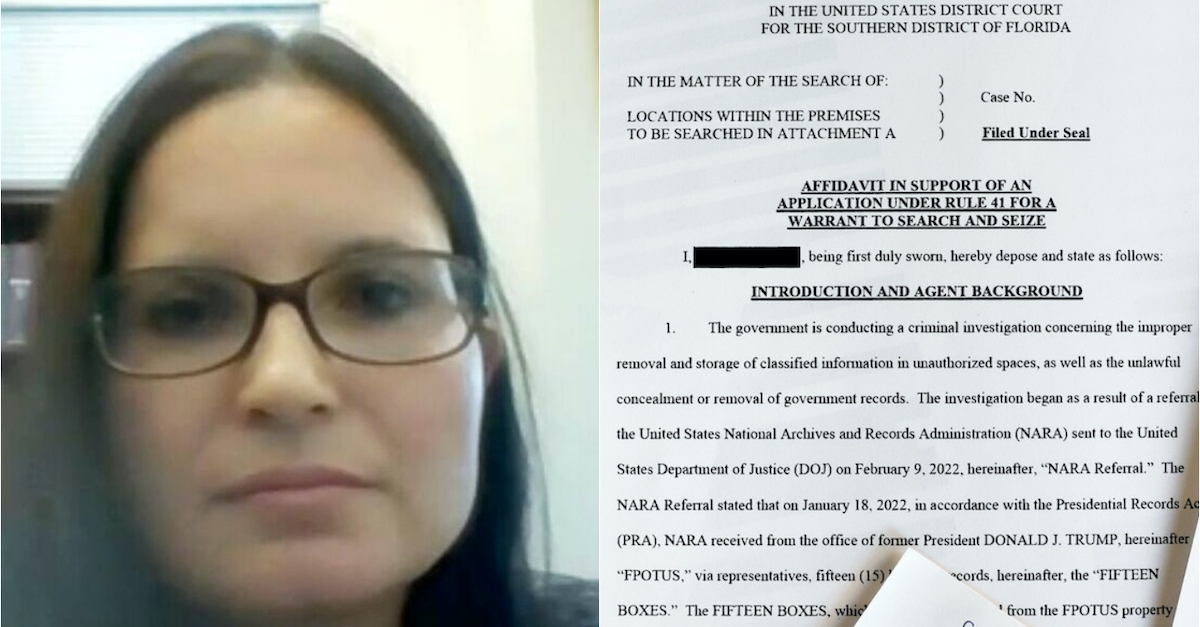
On the left, U.S. District Judge Aileen Cannon speaks during her confirmation hearing. The affidavit supporting the search warrant for Mar-a-Lago is on the right. (Image of Judge Cannon via U.S. Senate Judiciary Committee; Photo Illustration of Mar-a-Lago affidavit by Mario Tama/Getty Images)
Listen to the full episode on Apple, Spotify or wherever else you get your podcasts, and subscribe.
The former special master for the Sept. 11 Victim Compensation Fund and Deepwater Horizon disaster made clear in an interview that he saw no need for one to be appointed to review the highly classified documents found in former President Donald Trump’s Mar-a-Lago property.
“I think that this is judicial overreach, especially in a case involving highly sensitive classified documents,” prominent attorney Kenneth Feinberg, who has served as a special master in high-profile litigation and government appointments, said in an interview for Law&Crime’s podcast “Objections: with Adam Klasfeld.” “The court should not be intervening in such a executive branch function, traditionally and historically.”
A little more than a week ago, Trump-appointed U.S. District Judge Aileen Cannon did just that, finding judicial oversight justified by the “undeniably unprecedented” nature of an investigation of a former president. The government has appealed the order to the 11th Circuit, warning that the disclosure of the documents with “TOP SECRET” markings alone would cause “exceptionally grave damage” to U.S. national security.
Though agreeing with most legal experts on the propriety of Cannon’s ruling, Feinberg said he also appreciated the counterargument to his view: “Just because the Justice Department says it’s so doesn’t mean it’s so, and there ought to be a neutral, detached, independent third party to review the documents and determine whether or not as an independent neutral [third party], it is what the Justice Department says it is.”
“Balanced against that is issues of national security, issues of high levels of secrecy and protection,” he added.
However, Feinberg believes that the “courts ultimately have a more limited role to play in these highly, highly classified national security matters than might exist in another context.”
Prosecutors asked Cannon to pause aspects of the ruling forcing them to turn over more than 100 of the seized classified documents to the special master and forbidding them from using these in their ongoing criminal investigation for suspected violations of the Espionage Act, obstruction of justice and removal or destruction of records.
That means that, even if the Justice Department prevails on appeal, a special master likely will review the more than 11,000 government documents found inside Mar-a-Lago without classification markings. Both Trump and the Justice Department have selected two candidates for the job, and Judge Cannon will chose from among the four.
The special master assignments that Feinberg amassed over the course of his career were quite different from the role that Cannon will fill. In addition to 9/11 and Deepwater Horizon, Feinberg served as special master in the Roundup and Agent Orange litigations. He clarified the job duties and purpose of the position in the interview.
“A special master is an agent of the appointing authority, usually a court,” Feinberg said. “A court needs a special master to mediate, a court needs a special master to help distribute settlement proceeds. A court needs a special master to perform a review of documents before a trial. A special master is the legal term of art with wide scope of authority, depending on what the court needs in the way of scope, articulation of a function.”
Feinberg, who was appointed by the George W. Bush administration for his 9/11-related assignment and the Barack Obama administration for the Deepwater Horizon position, emphasized that a special master need not work for a court.
Listen to the podcast in full, below.